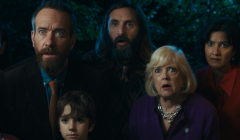
Waitrose Christmas mystery is solved
In part two of Saatchi & Saatchi’s ‘Sweet Suspicion’ campaign, audiences find out whodunnit.

Sincerity, emotional intelligence and humour help brands to keep their cool

Ever since the teenager was “invented” in the 1950s, brands have tirelessly pursued "cool" cultural currency. But “cool” can turn cold real quick. Given the horrific events unfolding around the world, the financial pressures that affect new generations, and technology that breaks down walls while building new ones up, marketers need to take a minute to ponder the dynamic nature of cool. How do successful brands keep their cool in dark times? With sincerity, emotional intelligence, and humour.
In times of peace and plenty, a notion of material cool dominated the cultural landscape. Brands played a pivotal role by offering products and experiences that allowed consumers to jump on the cool bandwagon. But cool is anything but static. It continually evolves, responding to social changes and significant events. In times of local and global trauma, cool takes on a new form. Suddenly, what's in your heart becomes more important than what's on your back.
Cool is anything but static. It continually evolves, responding to social changes and significant events.
Dave Bennett, Executive Director, Consumer, The Romans
During times of crisis and hardship, brands can help foster a sense of unity and empathy by embodying a new definition of cool, based around authenticity, empathy, and community.
Coca-Cola paved the way. The Vietnam War was a time of profound division and social reinvention in the United States and around the world. Brands dithered on whether to take a stand and if so, how. Coca-Cola nailed it. In 1971 the iconic brand launched an advert featuring a diverse group singing about peace - achieved through sharing a Coke. Sharing a vision of unity and harmony during a time of conflict and uncertainty made Coca-Cola's message resonate deeply with the public, earning Coke a place in the collective consciousness as a symbol of hope and positivity. Many other brands followed.
Sincerity is the foundation of success for brands during difficult times. Nobody appreciates a misery vulture. People, especially Gen Z, can spot inauthenticity from a mile away and so brands must genuinely care about the issues they address and align their actions with their messaging. Consumers need to see that brands are committed to making a positive difference in the world.
Brands must tread lightly when it comes to emotional intelligence. While it's crucial to be sensitive to the needs and concerns of the audience, brands should avoid excessive sentimentality. The goal is to engage and interest people while addressing the challenges of the moment. Striking the right balance allows brands to connect with consumers on an emotional level and be a source of support and understanding.
We’re often told laughter is the best medicine, and it’s kind of true. In challenging times humour can be a powerful tool for brands. While it's essential to address serious issues with empathy and sincerity, humour can serve as a source of relief and a way to connect with consumers on a human level. Humour helps to break down barriers and build super-strong bonds that last a lifetime with consumers.
As history shows us, brands that genuinely care about the well-being of their consumers and society at large have the potential to become symbols of hope and support in the darkest of times. They play a vital role in helping people find moments of light in the darkness, fostering a sense of unity and shared values. It is through their actions, not just their words, that brands can truly make a positive impact and leave a lasting mark on the world
Dave Bennett is a communications professional with 20 years’ experience in building consumer brands across owned, earned and paid media and across multiple geographies. Strong strategic, creative and commercial skills, with a passion for creating cultural touchpoints with consumers. Orchestrator of European and global communications campaigns for MARTINI, Heineken, Microsoft Xbox and Philips.
Looks like you need to create a Creativebrief account to perform this action.
Create account Sign inLooks like you need to create a Creativebrief account to perform this action.
Create account Sign in